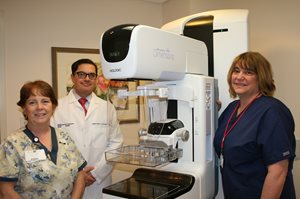Mammography Screenings
At the Exeter Hospital Breast Health Center, mammography screening is recommended per current national screening guidelines. These guidelines have been developed through extensive literature review of evidence-based data.
The American College of Radiology and the American Society of Breast Surgeons recommend:
- Routine yearly mammography screening starting at age 40 for women with an average risk for breast cancer.
- Women with a higher risk for breast cancer may benefit from supplemental screening.
.jpg.aspx?width=200&height=152) Exeter Hospital is pleased to offer 3D mammography (breast tomosynthesis), the latest and most accurate mammogram technology, for breast cancer screening at our Center for Breast Health. Breast tomosynthesis produces a three-dimensional view of the breast tissue that helps radiologists identify and characterize individual breast structures without the confusion of overlapping tissue. This means up to a 40% reduction in call back rates and additional testing for false positives.
Exeter Hospital is pleased to offer 3D mammography (breast tomosynthesis), the latest and most accurate mammogram technology, for breast cancer screening at our Center for Breast Health. Breast tomosynthesis produces a three-dimensional view of the breast tissue that helps radiologists identify and characterize individual breast structures without the confusion of overlapping tissue. This means up to a 40% reduction in call back rates and additional testing for false positives.
The tomosynthesis screening experience is similar to a traditional mammogram. During a tomosynthesis exam, multiple, low-dose images of the breast are acquired at different angles. These images are then used to produce a series of one-millimeter thick slices that can be viewed as a 3D reconstruction of the breast. This enables the radiologist to see small cancer tumors that otherwise may have been hidden by other breast structures.
All our mammograms are interpreted by board certified affiliated radiologists, doctors specializing in the diagnosis of diseases with the use of X-ray. At the Center for Breast Health, radiologists are on site Monday through Friday, 9:00 AM to 4:00 PM. Having radiologists onsite gives women the opportunity to have their questions answered directly. If there is ever a question about your mammogram, the technologist can review your images with the radiologist to ensure the pictures are complete.
There are two types of mammograms, both of which now use 3D technology:
Screening Mammogram:
A screening mammogram is an X-ray of the breast used to look for cancer in women who have no symptoms. The breasts are compressed to obtain a clear picture. The technologist will check the digital pictures to insure all the breast tissue is adequately imaged.
 Women can schedule their own screening mammogram appointment by calling 603-580-6966. A doctor’s order is not necessary, but you will need to provide the name of your doctor.
Women can schedule their own screening mammogram appointment by calling 603-580-6966. A doctor’s order is not necessary, but you will need to provide the name of your doctor.
To learn more about Screening Mammograms click here.
Diagnostic Mammogram:
A diagnostic mammogram is an x-ray of the breast focused on a specific concern or symptom, such as a new lump, changes in the look or feel of your breasts, or persistent pain in the breast. The radiologist will interpret the images and direct the exam. Should you need additional testing, such as an ultrasound, the added exams will be completed and the results of your study will be reviewed with you immediately following the completion of your testing.
You will need a doctor’s order for this exam.
Click here to learn more about Diagnostic Mammograms.
CAD System:
Computer Assisted Detection helps radiologists find suspicious areas on a mammogram. A computer analyzes the mammogram image then displays the picture on a video screen, with markers pointing to areas the radiologist should check more closely. CAD can be helpful when used by a skilled doctor, increasing the rate at which breast cancer is detected. All our mammograms are CAD checked.
Visit the breast360.org for more information on breast cancer screening and other breast health concerns.
Need help paying for a mammogram?
There are services for uninsured and under insured women.